胜利中学九年级英语练习卷UNIT1
人教版九年级英语全册 Unit 1 单元测试卷(含答案)
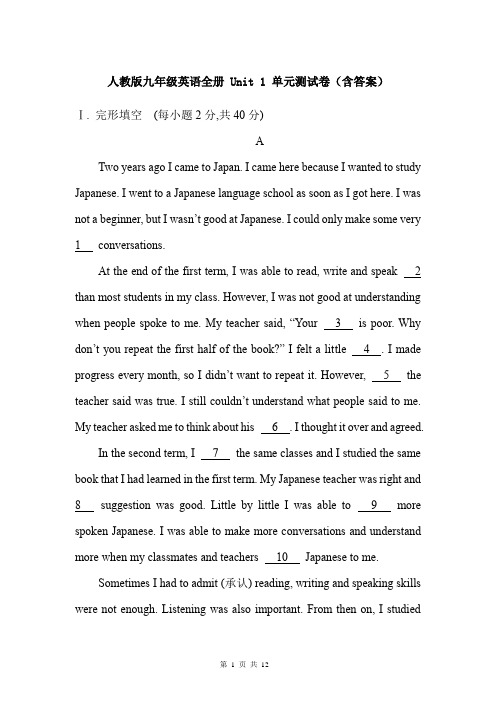
人教版九年级英语全册 Unit 1 单元测试卷(含答案)Ⅰ. 完形填空(每小题2分,共40分)ATwo years ago I came to Japan. I came here because I wanted to study Japanese. I went to a Japanese language school as soon as I got here. I was not a beginner, but I wasn’t good at Japanese. I could only make some very 1 conversations.At the end of the first term, I was able to read, write and speak 2 than most students in my class. However, I was not good at understanding when people spoke to me. My teacher said, “Your 3 is poor. Why don’t you repeat the first half of the book?” I felt a little 4 . I made progress every month, so I didn’t want to repeat it. However, 5 the teacher said was true. I still couldn’t understand what people said to me. My teacher asked me to think about his 6 . I thought it over and agreed.In the second term, I 7 the same classes and I studied the same book that I had learned in the first term. My Japanese teacher was right and 8 suggestion was good. Little by little I was able to 9 more spoken Japanese. I was able to make more conversations and understand more when my classmates and teachers 10 Japanese to me.Sometimes I had to admit (承认) reading, writing and speaking skills were not enough. Listening was also important. From then on, I studiedharder to improve my listening skill.1. A. difficult B. simple C. quick D. slow2. A. worse B. more C. better D. less3. A. reading B. writing C. listening D. speaking4. A. proud B. angry C. relaxed D. moved5. A. when B. how C. which D. what6. A. suggestion B. secret C. activity D. chance7. A. forgot B. repeated C. left D. increased8. A. his B. her C. their D. your9. A. notice B. understand C. add D. teach10. A. joined B. lent C. played D. spokeBAs a university student, I decided to learn German. I really liked the language, but I was not very good at learning it. The grammar 11me a lot and even drove me crazy. My only 12was listening—I always got an “A”. After two yea rs of study, I struggled (挣扎) to communicate in 13German and signed up (报名) to study in Germany to complete my degree. It was the hardest term I would ever have.The moment I 14Germany, I felt like I was starting from the beginning. The German I'd learned in university wasn't 15for everyday conversation. I was often nervous at school and I was 16my teachers. They always asked me some questions that I didn't understand.I only relaxed a little around my eightroommates, who were willing to speak German slowly to me and didn't seem to mind my 17.I chose to study three courses and the history class was the worst among them. The teacher spoke so 18that almost everything he said flew right over my head. I sat in the front, took notes and even recorded every single 19he said in class, but nothing helped.Years have passed, 20I still remember how it felt. That trip was a difficult but valuable lesson. I think my failure that term taught me just as much as my success.11.A.gave B.helped C.troubled D.saved12.A.action B.article C.agreement D.advantage13.A.perfect B.broken C.beautiful D.harmful14.A.arrived in B.handed in C.succeeded in D.took in15.A.peaceful B.painful eful D.careful16.A.pleased with B.angry with C.excited about D.afraid of17.A.purposes B.progress C.mistakes D.achievements18.A.slowly B.quickly C.clearly D.suddenly19.A.word B.book C.passage D.excuse20.A.and B.so C.but D.becauseⅡ.阅读理解(每小题2分,共20分)AChinese is getting more and more popular, so the UK government plans to invest (投资) 10 million pounds to help more kids learn Chinese. Do you think it is necessary for UK pupils to learn Chinese?Seneca (Canada)I studied French for 2 years in high school, and German for 4 years in college and got good marks. I studied Chinese for about 4 months before moving to China. For any language, if you don't use it, it will be easy to lose it. I've forgotten the French I learned except for a few phrases. I speak Chinese every day. My writing, reading and listening are quite good, but far from fluent. I think it's necessary to learn Chinese.Tony (the UK)Learning any language can be valuable, but it is not suitable for everyone. Chinese is a difficult language to learn, and teachers in the UK are not good at teaching foreign languages. However, China is a big and developing market for English business people. For them, Chinese is worth learning.Bill (the US)I don't think Chinese will replace (取代) English. Chinese is difficult to learn. To learn Chinese, you have to learn how to write and read it carefully. In the future Chinese will become more popular, so I think learning Chinese is a good thing.(E9301003)21.Seneca learnt German for .A.2 yearsB.4 monthsC.4 yearsD.6 years22.The underlined word “fluent” means “” in Chinese.A.糟糕的B.流利的C.完美的D.成熟的23.Tony thinks it's to learn Chinese.A.easyB.difficultelessD.interesting24.From the passage we know .A.Bill doesn't think Chinese will replace English in the futureB.Bill thinks it is easy to learn ChineseC.teachers in the UK are very good at teaching ChineseD.Seneca is very good at speaking Chinese25.What's the best title for the passage?A.How to learn Chinese wellB.Chinese is difficult to learnC.Do you like Chinese?D.Is it necessary to learn Chinese?BPerhaps you've seen the English letters “WC” in your city. They show public toilets. But do you know the expression is far from elegant (优雅的) English? In fact, foreigners from English⁃speaking countries rarely use the letters.Workers in our city are changing “WC” signs all over the city. The government is spending much money changing all the bad English on signs and restaurant menus. Many other places in China are following suit(照着做).“WC, or water closet, is old⁃fashioned English. It sounds dirty to me,” says Charlie Shifflet, a young man from the US. The old sign will become “Gents/Men” and “Ladies/Women”.“I see lots of poor English in everyday life, not only on signs,” he says. “I know what they mean. But they are Chinglish (中国式英语), not real English. For example, when someone says to me ‘My hometown is Henan Province.’ I know he should say, ‘My hometown is in Henan Province.’ ‘Hometown’ is a smaller place in a province.” The common mistakes he picked up include “Not Entry”, which should be “No Entry”. “Direction of Airport” should be changed into “To the Airport”. And it is “room rate”, not “room price”. And remember to “Keep off the grass”, rather than “Care of the green”. (E9301003)26.What does the writer think of the use of “WC”?A.He doesn't think it means “water closet”.B.He doesn't think it is old⁃fashioned English.C.He doesn't think it is proper for a sign.D.He thinks it is elegant English.27.The underlined word “rarely” means “”.A.sometimesB.seldomC.oftenD.always28.Charlie Shifflet .A.is a Chinese living in AmericaB.sometimes uses ChinglishC.likes to hear or see ChinglishD.thinks Chinese people sometimes use incorrect English29.The last paragraph is about .A.why there are so many Chinglish signsB.examples of ChinglishC.where Chinglish signs areD.who uses Chinglish signs30.We can read the passage from a magazine called “”.nguage LearningB.American HistoryC.Different CountriesD.Chinese CultureⅢ.语篇填空(每空2分,共20分)从方框中选择适当的词并用其正确形式填空,使短文通顺、意思完整。
(人教版)初中英语九年级Unit1单元测试试卷(含答案)02
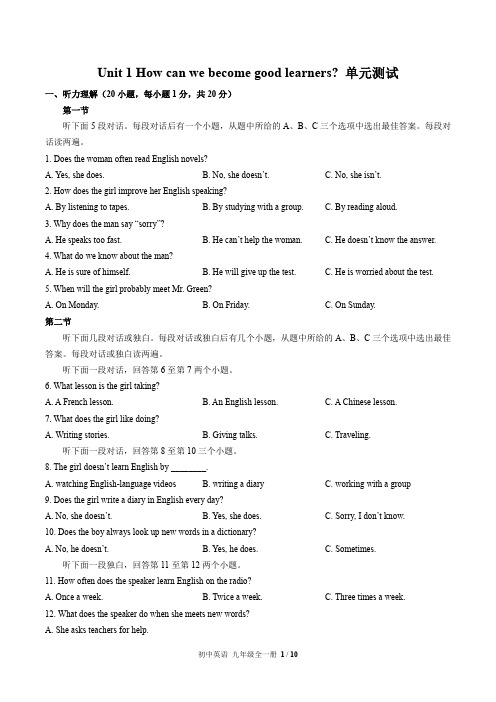
Unit 1 How can we become good learners? 单元测试一、听力理解(20小题,每小题1分,共20分)第一节听下面5段对话。
每段对话后有一个小题,从题中所给的A、B、C三个选项中选出最佳答案。
每段对话读两遍。
1. Does the woman often read English novels?A. Yes, she does.B. No, she doesn’t.C. No, she isn’t.2. How does the girl improve her English speaking?A. By listening to tapes.B. By studying with a group.C. By reading aloud.3. Why does the man say “sorry”?A. He speaks too fast.B. He can’t help the woman.C. He doesn’t know the answer.4. What do we know about the man?A. He is sure of himself.B. He will give up the test.C. He is worried about the test.5. When will the girl probably meet Mr. Green?A. On Monday.B. On Friday.C. On Sunday.第二节听下面几段对话或独白。
每段对话或独白后有几个小题,从题中所给的A、B、C三个选项中选出最佳答案。
每段对话或独白读两遍。
听下面一段对话,回答第6至第7两个小题。
6. What lesson is the girl taking?A. A French lesson.B. An English lesson.C. A Chinese lesson.7. What does the girl like doing?A. Writing stories.B. Giving talks.C. Traveling.听下面一段对话,回答第8至第10三个小题。
(人教版)初中英语九年级Unit1单元测试01(含答案)
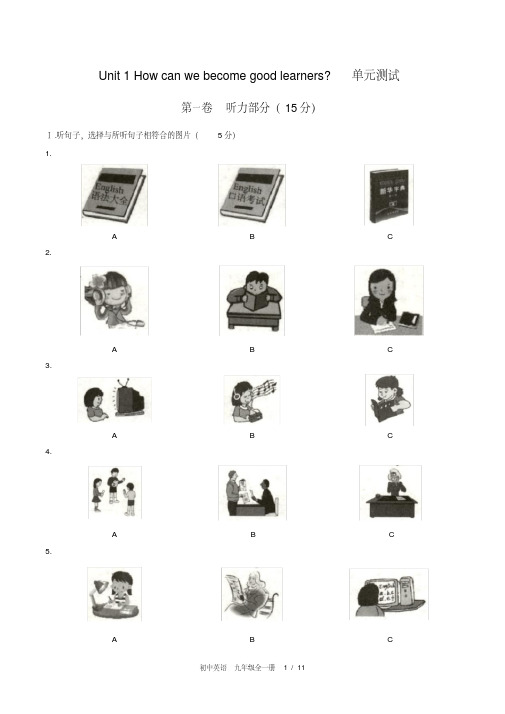
Unit 1 How can we become good learners? 单元测试第一卷听力部分(15分)Ⅰ.听句子,选择与所听句子相符合的图片(5分)1.A B C2.A B C 3.A B C 4.A B C 5.A B CⅡ.听两段较长对话,选择最佳答案(5分)听第一段对话,回答第6~7小题。
6. What kind of skills does the boy want to improve?A. His speaking skills.B. His reading skills.C. His writing skills.7. What does the girl do to help the boy?A. She lends him a dictionary.B. She lends him a grammar book.C. She teaches him how to keep a diary.听第二段对话,回答第8~10小题。
8. Does the girl ever go to the English corner?A. Yes, she does.B. No, she doesn’t.C. We don’t know.9. What’s the most important thing for the girl?A. She should open her mouth and speak up.B. She should make friends with others.C. She should join an English club.10. What does the man advise the girl to do first?A. Find a penfriend.B. Talk with one or two students.C. Speak aloud to herself first.Ⅲ.听短文,完成表格信息。
九年级英语Unit1基础知识训练卷(含答案)
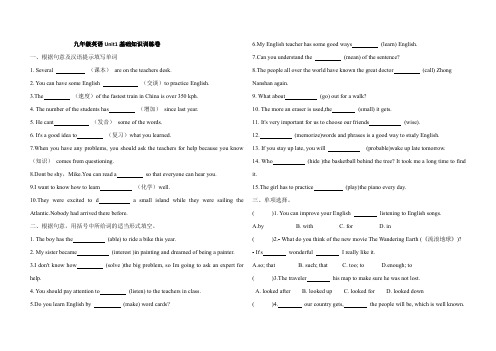
九年级英语Unit1基础知识训练卷一、根据句意及汉语提示填写单词1. Several (课本)are on the teachers desk.2. You can have some English (交谈)to practice English.3.The (速度)of the fastest train in China is over 350 kph.4. The number of the students has (增加)since last year.5. He cant (发音)some of the words.6. It's a good idea to (复习)what you learned.7.When you have any problems, you should ask the teachers for help because you know (知识)comes from questioning.8.Dont be shy,Mike.You can read a so that everyone can hear you.9.I want to know how to learn (化学)well.10.They were excited to d a small island while they were sailing the Atlantic.Nobody had arrived there before.二、根据句意,用括号中所给词的适当形式填空。
1. The boy has the (able) to ride a bike this year.2. My sister became (interest )in painting and dreamed of being a painter.3.I don't know how (solve )the big problem, so Im going to ask an expert for help.4. You should pay attention to (listen) to the teachers in class.5.Do you learn English by (make) word cards?6.My English teacher has some good ways (learn) English.7.Can you understand the (mean) of the sentence?8.The people all over the world have known the great doctor (call) Zhong Nanshan again.9. What about (go) out for a walk?10. The more an eraser is used,the (small) it gets.11. It's very important for us to choose our friends (wise).12. (memorize)words and phrases is a good way to study English.13. If you stay up late, you will (probable)wake up late tomorrow.14. Who (hide )the basketball behind the tree? It took me a long time to find it.15.The girl has to practice (play)the piano every day.三、单项选择。
九年级全一册英语同步练习Unit 1 综合训练(含答案)

Unit1综合训练第一卷听力部分Ⅰ.听句子,选择与所听句子相符合的图片Ⅱ.听两段较长对话,选择最佳答案听第一段对话,回答第6~7小题。
6.What kind of skills does the boy want to improve?A.His speaking skills.B.His reading skills.C.His writing skills.7.What does the girl do to help the boy?A.She lends him a dictionary.B.She lends him a grammar book.C.She teaches him how to keep a diary.听第二段对话,回答第8~10小题。
8.Does the girl ever go to the English Corner?A.Yes, she does.B.No, she doesn’t.C.We don’t know.9.What’s the most important thing for the girl?A.She should open her mouth and speak up.B.She should make friends with others.C.She should join an English club.10.What does the man advise the girl to do first?A.Find a pen pal.B.Talk with one or two students.C.Speak aloud to herself first.To write the names on the objects and say the words when you see them. You can write “bottle” on a piece of paper, and place it 15.. Say it as soon as you see it.第二卷笔试部分Ⅳ.单项选择16.— do you usually get the information about it?—By searching for the news on the Internet.A.WhyB.WhereC.WhenD.How17.—Sir, do you think I can do the job?—It’s hard for us to measure your before we see your work.A.abilityB.relationC.inventionD.expression18.I don’t have a partner to practice English on the weekend.A.toB.withC.aboutD.for19.It takes a long time to master it, so please be .A.quickB.creativeC.loudD.patient20.I didn’t catch what you said just now. Can you it again?A.replyB.reviewC.repeatD.refuse21.You don’t have to every new word in the dictionary while reading.A.look forB.look atC.look upD.look after22.If you want to study well, you must what the teacher says in class.A.worry aboutB.be born withC.pay attention toD.fall in love with23.I think is very hard for me a foreigner.A.that; to understandB.it; understandC.it; to understandD.that; understand24.She seldom spoke English after class, for she was afraid mistakesgrammar.A.make; ofB.of making; ofC.make; inD.of making; in25.As the old saying goes,“.”So practice more, and you’ll make more progress.A.It’s a piece of cakeB.It serves you righte it or lose itD.Practice makes perfectⅤ.完形填空You may think that English dictionaries have been used for many, many centuries. In fact, an English dictionary you 26today wasn’t made until the Qing Dynasty (清朝). Three men did most of the important 27 work on dictionaries. They spent nearly all their lives trying to 28 words for their dictionaries. For them, it was a wonderful journey. The largest dictionary in the world is the Oxford English Dictionary. The 29 for this dictionary came from an important meeting in Britain in 1857.Twenty-two years later, Oxford University asked James Murray to be the editor (编辑、编者) of its new dictionary.Murray had never been to 30. At the age of fourteen, he left his village school in Scotland and taught himself while working in a bank. 31 he became a great teacher. After Oxford gave him the job, Murray had a small house 32 in his garden to do the work. Every morning, Murray got out of bed at five o’clock and 33 in the small house several hours before breakfast. Often he would work into the night. Murray hoped to finish the new dictionary in ten years. But after five years, he was 34 adding words for the letter “A”! He worked on the dictionary 35 he was very old.Forty-four years later, in 1928, other editors finished the dictionary.26.A.write e C.copy D.miss27.A.early B.boring C.easy D.difficult28.A.spell B.collect C.invent D.make29.A.way e C.idea D.prize30.A.school B.cinema C.village D.college31.A.Ever since B.Since then C.So far ter32.A.built B.sold C.broken D.drawn33.A.read B.wrote C.worked D.thought34.A.already B.still ually D.always35.A.if B.because C.until D.unlessⅥ.阅读理解AIt seems more and more Americans want schools to teach foreign languages to children younger than five years old. The most popular way to teach these young children another language is called immersion (沉浸式语言教学法).Children in immersion programs hear only the new language in the classroom. The children play games, sing songs and talk to one another in the new language. Some experts (专家) say immersion programs are the most effective (有效的) way for young children to learn a language. But there can be a problem when children in the United States begin to learn another language at such an early age. Not many elementary schools continue to teach a foreign language. Only seven of the fifty states require (要求) schools to teach a foreign language to students between the ages of six and twelve. Language experts say it is easier for younger children to learn a language. Still, American schools generally do not begin to teach foreign languages until secondary schools. By then, students are about thirteen years old.American schools face difficult choices about the cost of educational programs. The government has increased support for foreign language study in its education law called No Child Left Behind.At the college, the Modern Language Association says more students than ever are studying foreign languages and more languages are being studied now than in the past. Spanish is the most widely (广泛地) taught in American colleges and universities. French, German, Chinese and Italian are also popular.36.The most popular way to teach the American children another language is called .A.taskB.speakingC.immersionD.listening37.Where is Spanish the most widely taught?A.In American colleges and universities.B.In American secondary schools.C.In American high schools.D.In American elementary schools.38.Students in immersion programs can do the following things EXCEPT .A.talking to one another in the new languageB.hearing their native languageC.playing games in the new languageD.hearing the new language39.Which of the following is TRUE according to the passage?A.The government doesn’t support this program.B.All schools will take part in the immersion program.C.It’s the best for children to learn a foreign language at an early age.D.Not many elementary schools continue to teach a foreign language.40.What is the passage mainly about?A.Foreign language teaching in America.B.Foreign language teaching ways in America.C.Foreign language teaching in American universities.D.Foreign language teaching in American high schools.BWhen you are learning a language, listening, speaking and writing are important, but reading can also be very helpful. When you read, you cannot only learn some new words, but also learn how to use them. When you read a passage, it gives you a good example for writing.Here are some good reading tips.Firstly, try to read at the right level (水平). Read something that you can understand. If it is too hard for you, it is not interesting.Secondly, try to understand the new words. If there are four or five new words on a page, don’t use a dictionary. Instead, try to guess their meanings as you read. Mark (做标记) them with a pencil. Then look them up in a dictionary when you finish reading, and write them in your own vocabulary book. Try to remember them.Thirdly, try to read for a short time once a day. Fifteen minutes or half an hour every day is better than two hours every Sunday. For example, you can read before you go to bed, or after you get up or at lunchtime.Lastly, read something that interests you. Choose a newspaper, a book or a magazine about a subject that you like. It will be easy enough for you to understand.41.The underlined word “tips” in the passage means “” in Chinese.A.末端B.小费C.处所D.建议42.How many reading tips does the writer give us?A.Six.B.Five.C.Four.D.Three.43.If you meet a few new words on a page while reading, you can .A.stop readingB.guess the meanings at firstC.write them down at onceD.look them up right away44.Which of the following is TRUE according to the passage?A.Reading a lot can help you write better.B.It is useful for you to read for long once a week.C.When you read, you can only learn some new words.D.Try to read something hard to make your English better.45.Which is the best title for the passage?A.How to look up a new wordB.How to make reading betterC.How to remember new wordsD.How to choose something to readCHi Brad,It’s good to hear from you again. I find that I’m not good at writing compositions. It’s hard for me to prepare the form of a composition and organize sentences. ①Could you tell me how to deal with this problem? I would really appreciate it if you offer me some good methods.Best wishes,Cindy Hi Cindy,A composition is really a story and any story is told to an audience. There is a form for this and it has three parts. First, tell them (the audience)what you are going to tell them. Then tell them, and finally tell them what you told them. Parts One and Three are short and most of the information is in Part Two. It works like this.Let’s say you are asked to write a 200-word composition about your visit to the Great Wall. You would begin with an opening sentence or two saying something like “The Great Wall of China is a national ②landmark that is famous around the world. I visited it last summer and I want to tell you about it.” That uses about 25 words to tell them what you are going to tell them.The second part would be about 150 words and would contain information about the Great Wall such as how long it is, when it was built, who built it and why, and the fact that it is one of the seven wonders of the world and you would talk about how you felt and what you thought when you visited this national treasure. This is telling them.Finally, you would use about another 25 words to say something like “That was my first visit to the Great Wall and it was a very emotional experience to actually touch something so old and famous. ③每个中国人应至少参观长城一次。
九年级英语第一单元测试卷【含答案】

九年级英语第一单元测试卷【含答案】专业课原理概述部分一、选择题(每题1分,共5分)1. 下列哪个单词的发音与其他选项不同?A. catB. dogC. fishD. bird2. 选择正确的介词填空:“He is _______ the library.”A. inB. onC. atD. to3. 下面哪个句子使用了正确的时态?A. She go to school bus.B. He goes to school bike.C. They goes to school on foot.D. I going to school trn.4. 选择正确的单词填空:“Can you help me _______ the book?”A. findB. findsC. findingD. to find5. 下列哪个单词意为“快乐”?A. sadB. happyC. angryD. tired二、判断题(每题1分,共5分)1. “I like apples”这句话的主语是“apples”。
()2. “She can swim”意味着她不能游泳。
()3. “He is reading a book”使用了现在进行时态。
()4. “They went to the park yesterday”意味着他们今天去了公园。
()5. “I don't have any money”意味着我有一些钱。
()三、填空题(每题1分,共5分)1. My mother is a _______. She works in a hospital.2. _______ you like some coffee?3. I _______ to the movies last night.4. They _______ home at 6 pm every day.5. She _______ a new car last month.四、简答题(每题2分,共10分)1. 请写出五种不同的交通工具。
九年级英语unit1 综合提优测试卷(含答案)
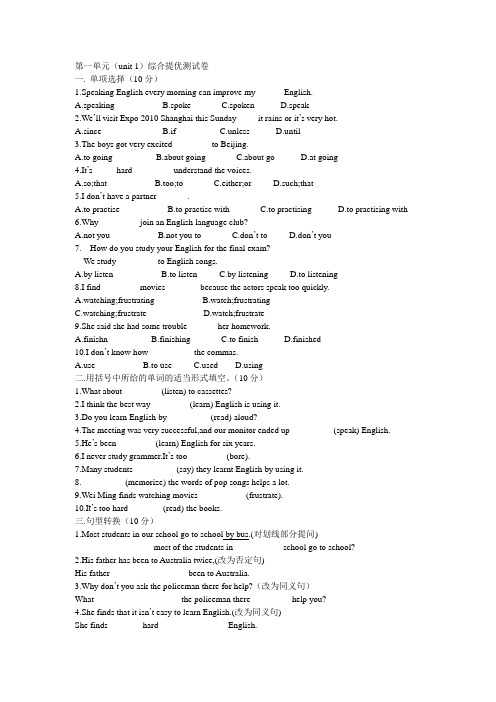
第一单元(unit 1)综合提优测试卷一.单项选择(10分)1.Speaking English every morning can improve my ______English.A.speakingB.spokeC.spokenD.speak2.We’ll visit Expo 2010 Shanghai this Sunday_____it rains or it’s very hot.A.sinceB.ifC.unlessD.until3.The boys got very excited_________to Beijing.A.to goingB.about goingC.about goD.at going4.It’s _____hard _________understand the voices.A.so;thatB.too;toC.either;orD.such;that5.I don’t have a partner_______.A.to practiseB.to practise withC.to practisingD.to practising with6.Why _________join an English language club?A.not youB.not you toC.don’t toD.don’t you7.---How do you study your English for the final exam?---We study _________to English songs.A.by listenB.to listenC.by listeningD.to listening8.I find_________movies________because the actors speak too quickly.A.watching;frustratingB.watch;frustratingC.watching;frustrateD.watch;frustrate9.She said she had some trouble_______her homework.A.finishnB.finishingC.to finishD.finished10.I don’t know how __________the commas.eB.to useeding二.用括号中所给的单词的适当形式填空。
九年级英语Unit1单元测试卷(含答案)
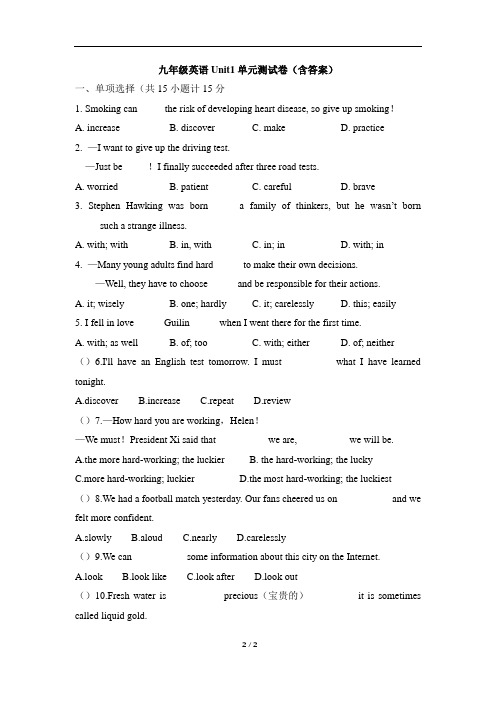
九年级英语Unit1单元测试卷(含答案)一、单项选择(共15小题计15分1. Smoking can _____the risk of developing heart disease, so give up smoking!A. increaseB. discoverC. makeD. practice2. —I want to give up the driving test.—Just be_____!I finally succeeded after three road tests.A. worriedB. patientC. carefulD. brave3. Stephen Hawking was born ____ a family of thinkers, but he wasn’t born _____such a strange illness.A. with; withB. in, withC. in; inD. with; in4. —Many young adults find hard _____ to make their own decisions.—Well, they have to choose _____ and be responsible for their actions.A. it; wiselyB. one; hardlyC. it; carelesslyD. this; easily5. I fell in love _____ Guilin _____ when I went there for the first time.A. with; as wellB. of; tooC. with; eitherD. of; neither()6.I'll have an English test tomorrow. I must __________what I have learned tonight.A.discoverB.increaseC.repeatD.review()7.—How hard you are working,Helen!—We must!President Xi said that __________we are, __________we will be.A.the more hard-working; the luckierB. the hard-working; the luckyC.more hard-working; luckierD.the most hard-working; the luckiest()8.We had a football match yesterday. Our fans cheered us on __________ and we felt more confident.A.slowlyB.aloudC.nearlyD.carelessly()9.We can __________ some information about this city on the Internet.A.lookB.look likeC.look afterD.look out()10.Fresh water is __________ precious(宝贵的)__________it is sometimes called liquid gold.A.such; thatB. too; toC.as; asD.so; that()11.—I don’t know __________ the new English words.—Don't worry!Try thinking about their pronunciations.A.why to rememberB. how to rememberC.where to rememberD.when to remember()12.—Julie,don't talk with your classmate. Please __________ what I'm saying. —I'm sorry,Mrs.Han.A.bring outB.look forward toC.check outD.pay attention to()13.You will still miss the flight __________ you catch a Didi car.A.even ifB.as ifC.untilD.before()14.I __________ my test paper twice, so I believe my answers arc all right.A. checkB.am checkingC. have checkedD.will check()15.—I have worked hard at English for more than two weeks, but it hasn’t improved.—D on’t worry.__________. I’m sure you can do better soon.A.It takes timeB.That’s too badC.That’s OKD.Don’t mention it二、完形填空(共10小题,计10分)。
人教版九年级英语全册Unit 1单元测试卷(含答案)
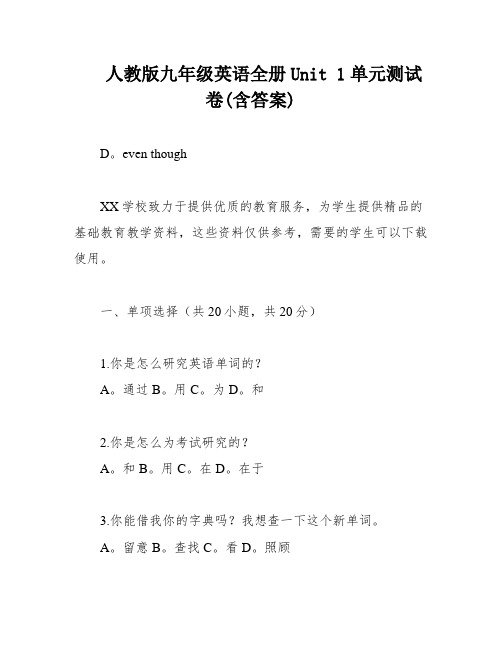
人教版九年级英语全册Unit 1单元测试卷(含答案)D。
even thoughXX学校致力于提供优质的教育服务,为学生提供精品的基础教育教学资料,这些资料仅供参考,需要的学生可以下载使用。
一、单项选择(共20小题,共20分)1.你是怎么研究英语单词的?A。
通过 B。
用 C。
为 D。
和2.你是怎么为考试研究的?A。
和 B。
用 C。
在 D。
在于3.你能借我你的字典吗?我想查一下这个新单词。
A。
留意 B。
查找 C。
看 D。
照顾4.当你参观博物馆时,你应该注意指示,不要违背它们。
A。
与。
比较 B。
期待 C。
注意 D。
尝试5.科学家们还没有发现火星上有生命。
A。
发现 B。
找出 C。
寻找 D。
探索6.尽管失败了四次,但XXX没有放弃。
A。
如果 B。
当。
的时候 C。
虽然 D。
因为7.她很早就去了那里,所以找到了一个好位置。
A。
如此。
以至于 B。
太。
以至于 C。
如此。
以致于 D。
足够。
以至于8.XXX,如果你的学生在课堂上不遵守规则,你会生气吗?A。
如果 B。
除非 C。
虽然 D。
即使删除明显有问题的段落)改写后的文章已经没有格式错误)9.The family had to stay at the hotel because it was raining hard.10.It is XXX.11.--- How do you study English?I study English by talking with foreign students.12.--- Dad。
look at the building。
It is on fire.Call 119 on your mobile phone right now.13.Don't be afraid of new words。
You can look them up in the nary.14.Did you pay n to XXX?15.--- Did you know who invented tea?XXX.16.Although Switzerland is very small。
九年级英语Unit1单元测试卷及答案

九年级英语上册Unit 1单元测试卷(含答案)Ⅰ. 单项选择(15分)( ) 1. — Have you ever read _____ essay on how to improve spoken English?— Yes, I have. Now I speak English as _____ second language.A. an; theB. a; theC. an; aD. a; a( ) 2. It’s our _____ to look after our parents when they get old.A. dutyB. habitC. problemD. decision( ) 3. Our Chinese teacher is very kind to us. So we all regard her _____ our best friend.A. byB. asC. forD. with( ) 4. After a serious illness, he finally _____ the importance of health.A. realizedB. meantC. addedD. impressed( ) 5. Would you please drive more _____, Frank? The train is leaving soon.A. slowlyB. quicklyC. clearlyD. carefully( ) 6. —Mr. Wang, I have trouble _______ the text.—Remember _______ it three times at least.A. to understand, readingB. understanding, readingC. understanding, to readD. to understand, to read( ) 7. —It’s Sunday today. How about _________ the mountains?—Sounds great.A. to climbB. climbC. climbedD. climbing( ) 8. I _____ the sea. I don’t know how to swim.A. likeB. am afraidC. am afraid toD. am afraid of( ) 9. Mom read the instructions to find out ______ the computer.A. what to useB. how to useC. why to useD. when to use( ) 10. —I am sorry to trouble you.—__________A. You are welcome.B. It doesn’t matter.C. It isn’t matter.D. My pleasure.( ) 11. Scientists are trying to think of a better way to _____ the environmental pollution.A. decide onB. write downC. take awayD. deal with( ) 12. By studying hard and _____, you will achieve your dream.A. give upB. giving upC. not giving upD. not to give up( ) 13. — _____ do you learn English, Zhao Wei?— By listening to tapes and doing more speaking.A. WhatB. WhenC. WhyD. How( ) 14. —Why don’t you listen to VOA to practice your listening?—Well, I find it’s _____ quick for me _____ follow.A. too; toB. so; thatC. such; thatD. enough; to( ) 15. —Our English teacher talked so fast that I couldn’t understand every word.— _____ You can try to listen to the most important words.A. Sounds great!B. Of course.C. It doesn’t matter.D. Help yourself.Ⅱ. 完形填空(10分)阅读下列短文,选择可以填入空白处的最佳选项。
九年级英语Unit1Topic1练习题及答案解析
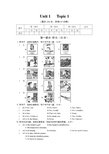
Unit 1 Topic 1(满分100分,时间90分钟)第一部分听力(20分)Ⅰ.听句子,选择正确图片。
每个句子读一遍。
(5分)( )1.. . .( )2.. . .( )3.. . .( )4.. . .( )5.. . .Ⅱ.听句子,选择正确答语。
每个句子读一遍。
(5分)( )6.A.Yes, I do. B.No, I have. C.Yes, I have.( )7.A.Sure. B.Yes, I could. C.No, I couldn’t.( )8.A.Sure. B.That’s all right. C.Great.( )9.A.Yes, I’d like to. B.No, thank you. C.Yes, I’d like.( )10.A.To the library. B.Never. C.No, I haven’t.Ⅲ.听对话及问题,选择正确答语。
每段对话和问题读两遍。
(5分)( )11.A.She helped a girl. B.She helped a disabled boy.C.She helped her classmate.( )12.A.In Beijing. B.At home. C.At her uncle’s home.( )13.A.To play with her granny.B.To help the disabled granny.C.To travel to America.( )14.A.To play basketball. B.To watch TV. C.To see a movie.( )15.A.Wide but dirty. B.Wide and clean. C.Narrow and dirty.Ⅳ第二部分基础知识运用(55分)Ⅰ.单项选择。
(10分)( )1.—Where are Maria and Kangkang?—They _____ England.A.have been toB.are awayC.have gone toD.had been in( )2._____ the Great Green Wall, the land produces (生产出) more crops.A.Thanks forB.Thanks toC.Thank toD.Thank for( )3.I think that you have made so rapid _____ in math.A.a progressB.progressC.progressesD.progressed( )4.—How do you like Beijing, Miss Read?—I’ve no idea. I _____ there.A.have goneB.have beenC.haven’t beenD.haven’t gone( )5.—What _____ to your village in recent years?—Lots of roads, buildings, parks and so on.A.takes placeB.have happenedC.has happenedD.happened( )6.—What did you do during your summer holiday?—I spent my holiday _____ English in Summer Classes.A.improvingB.improvesC.to improveD.improve( )7. I have broken your glasses. I feel sorry _____ it.A.toB.atC.withD.for( )8.The family was _____ poor _____ they couldn’t buy a TV set.A.so; thatB.not; untilC.not; butD.so; but( )9.—_____ my daughter is only ten years old, she knows a lot.—What a clever girl!A.BecauseB.WhetherC.ThoughD.So( )10.—Have you seen my brother?—Yes. I _____ him in the library five minutes ago.A.metB.have metC.meetD.have been met Ⅱ.情景交际。
九年级上册英语Unit1单元测试卷(含答案)
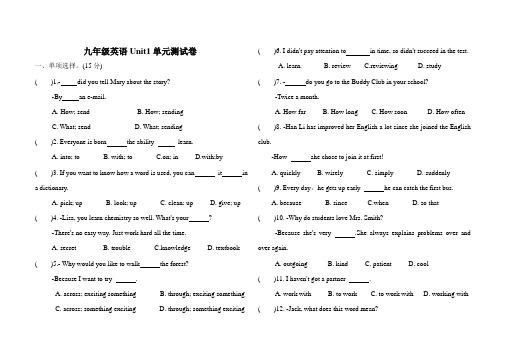
九年级英语Unit1单元测试卷一、单项选择。
(15分)( )1.- did you tell Mary about the story?-By an e-mail.A.How; sendB. How; sendingC. What; sendD. What; sending( )2. Everyone is born the ability learn.A. into; toB. with; toC.on; inD.with;by( )3. If you want to know how a word is used, you can it in a dictionary.A. pick; upB. look; upC. clean; upD. give; up ( )4. -Lisa, you learn chemistry so well. What's your ?-There's no easy way. Just work hard all the time.A. secretB. troubleC.knowledgeD. textbook ( )5.- Why would you like to walk the forest?-Because I want to try .A. across; exciting somethingB. through; exciting somethingC. across; something excitingD. through; something exciting ( )6. I didn't pay attention to in time, so didn't succeed in the test.A. learnB. reviewC.reviewingD. study( )7. - do you go to the Buddy Club in your school?-Twice a month.A. How farB. How longC. How soonD. How often ( )8. -Han Li has improved her English a lot since she joined the English club.-How she chose to join it at first!A. quicklyB. wiselyC. simplyD. suddenly ( )9. Every day,he gets up early he can catch the first bus.A. becauseB. sinceC.whenD. so that( )10. -Why do students love Mrs. Smith?-Because she's very .She always explains problems over and over again.A. outgoingB. kindC. patientD. cool( )11. I haven't got a partner .A. work withB. to workC. to work withD. working with ( )12. -Jack, what does this word mean?-Why don't you ? You have an English-Chinese dictionary.A. look it upB. look up itC. look it forD. look for it ( )13. I think you need English every day.A. practice to speakB. to practice to speakC. to practice speakingD.practice speaking( )14. you work, grades you will get.A. The harder; the bestB. The hard; the goodC. Harder: betterD. The harder;the better( )15. -My bike doesn't work. Can you help me, Lucy?-Sure. It's a piece of cake.A.It's easy.B. It 's delicious.C. It's hungry.D. It's difficult.二、完形填空。
九年级上册英语Unit1综合测试卷(附答案)
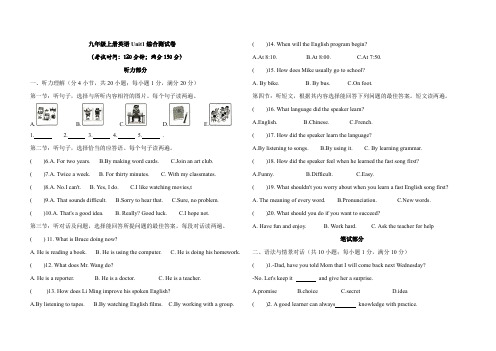
九年级上册英语Unit1综合测试卷(考试时间:120分钟;满分150分)听力部分一、听力理解(分4小节,共20小题;每小题1分,满分20分)第一节:听句子,选择与所听内容相符的图片。
每个句子读两遍。
A. B. C. D. E.1. 2. 3. 4. 5. .第二节:听句子,选择恰当的应答语。
每个句子读两遍。
( )6.A. For two years. B.By making word cards. C.Join an art club.( )7.A. Twice a week. B. For thirty minutes. C. With my classmates.( )8.A. No.I can't. B. Yes, I do. C.I like watching movies,t( )9.A. That sounds difficult. B.Sorry to hear that. C.Sure, no problem.( )10.A. That's a good idea. B. Really? Good luck. C.I hope not.第三节:听对话及问题,选择能回答所提问题的最佳答案。
每段对话读两遍。
( ) 11. What is Bruce doing now?A. He is reading a book.B. He is using the computer.C. He is doing his homework. ( )12. What does Mr. Wang do?A. He is a reporter.B. He is a doctor.C. He is a teacher.( )13. How does Li Ming improve his spoken English?A.By listening to tapes.B.By watching English films.C.By working with a group.( )14. When will the English program begin?A.At 8:10.B.At 8:00.C.At 7:50.( )15. How does Mike usually go to school?A. By bike.B. By bus.C.On foot.第四节:听短文,根据其内容选择能回答下列问题的最佳答案。
九年级Unit1测试题及答案
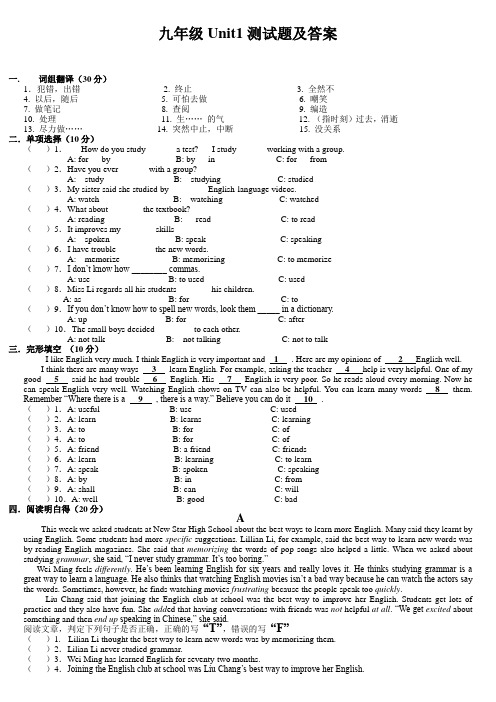
九年级Unit1测试题及答案一.词组翻译(30分)1.犯错,出错______________ 2. 终止_____________ 3. 全然不_____________4. 以后,随后____________5. 可怕去做______________6. 嘲笑_______________7. 做笔记_______________ 8. 查阅_____________ 9. 编造______________10. 处理______________ 11. 生……的气__________ 12. (指时刻)过去,消逝________________13. 尽力做……_____________ 14. 突然中止,中断____________ 15. 没关系________________二.单项选择(10分)()1.---- How do you study ______ a test?---- I study ______ working with a group.A: for by B: by in C: for from()2.Have you ever ______ with a group?A: study B: studying C: studied()3.My sister said she studied by ________ English-language videos.A: watch B: watching C: watched()4.What about _______ the textbook?A: reading B: read C: to read()5.It improves my _______ skillsA: spoken B: speak C: speaking()6.I have trouble ________ the new words.A: memorize B: memorizing C: to memorize()7.I don’t know how ________ commas.A: use B: to used C: used()8.Miss Li regards all his students _______ his children.A: as B: for C: to()9.If you don’t know how to spell new words, look them _____ in a dictionary.A: up B: for C: after()10.The small boys decided ________ to each other.A: not talk B: not talking C: not to talk三.完形填空(10分)I like English very much. I think English is very important and 1 . Here are my opinions of 2 English well.I think there are many ways 3 learn English. For example, asking the teacher 4 help is very helpful. One of mygood 5 said he had trouble 6 English. His 7 English is very poor. So he reads aloud every morning. Now he can speak English very well. Watching English shows on TV can also be helpful. You can learn many words 8 them.Remember “Where there is a 9 , there is a way.” Believe you can do it 10 .()1.A: useful B: use C: used()2.A: learn B: learns C: learning()3.A: to B: for C: of()4.A: to B: for C: of()5.A: friend B: a friend C: friends()6.A: learn B: learning C: to learn()7.A: speak B: spoken C: speaking()8.A: by B: in C: from()9.A: shall B: can C: will()10.A: well B: good C: bad四.阅读明白得(20分)AThis week we asked students at New Star High School about the best ways to learn more English. Many said they learnt by using English. Some students had more specific suggestions. Lillian Li, for example, said the best way to learn new words was by reading English magazines. She said that memorizing the words of pop songs also helped a little. When we asked about studying grammar, she said, “I never study grammar. It’s too boring.”Wei Ming feels differently. He’s been learning English for six years and really loves it. He thinks studying grammar is a great way to learn a language. He also thinks that watching English movies isn’t a bad way because he can watch the actors sa y the words. Sometimes, however, he finds watching movies frustrating because the people speak too quickly.Liu Chang said that joining the English club at school was the best way to improve her English. Students get lots of practice and they also have fun. She add ed that having conversations with friends was not helpful at all. “We get excited about something and then end up speaking in Chinese,” she said.阅读文章,判定下列句子是否正确,正确的写“T”,错误的写“F”()1.Lilian Li thought the best way to learn new words was by memorizing them.()2.Lilian Li never studied grammar.()3.Wei Ming has learned English for seventy-two months.()4.Joining the English club at school was Liu Chang’s best way to improve her English.()5.Liu Chang thought having conversations with friends was helpful.B()1. What activity does the Community Center have on Tuesday?A: Chess Club Meeting B: Bing go C: Movie()2. When is the sewing class?A: on Monday B: On Friday C: On Wednesday()3. What time does the movie start on January 9?A: 9 pm B: 8 pm C. 10-11 pm()4. If you want to go to Shopping Trip, when can you go?A: On Jan 11 B: On Tuesday 7-9 pm C. On Jan 27()5. What is happening on Jan 20?A: Dance Class B: Dinner and Dancing C: Shopping Trip五.翻译句子(10分)1.I study by reading the textbook.______________________________________________________________.2.I can’t pronounce some of the new words._______________________________________________________________.3.It wasn’t easy for me to understand the teacher when she talked._______________________________________________________________.4.He thinks making flashcards is a good way to learn English._______________________________________________________________.5.Tom said studying grammar is not helpful at all.________________________________________________________________.六.依照中文完成句子(10分)1.我的叔叔经常询问我的学习情形。
初中英语九年级全册Unit 1经典测试卷(含答案解析)

一、选择题1.People have come to know that their health must ______.A.pay more attention B.pay more attention toC.be paid more attention D.be paid more attention to D解析:D【解析】句意:人们已经认识到他们的健康必须受到更多的关注。
考查被动语态和动词短语。
从句主语their health是动词pay的受动者,需用被动语态,即be+过去分词结构,可排除AB两项。
从句主语health同时是介词短语pay attention to的逻辑宾语,不可省略介词to。
根据句意结构和语境,可知选D。
2.As teenagers we shouldn't always _________ our parents. We should learn to be independent.A.argue with B.depend on C.learn from D.hear of B解析:B【详解】句意:作为青少年,我们不应该总是依赖父母。
我们应该学会独立。
考查动词短语。
A. argue with与……争辩,争论;B. depend on依赖,依靠;C. learn from 向……学习;D. hear of 听说,获悉,收到……的消息。
根据下文“我们应该学会独立。
”可知“作为青少年,我们不应该总是依赖父母。
”故选B。
3."A white elephant" means something that is useless,_________ it may cost a lot of money. A.unless B.until C.although D.so C解析:C【解析】【详解】句意:“白象”是指无用的东西,尽管它可能要花很多钱。
考查连词辨析。
最新九年级英语Unit 1试题及答案

一、选择题1.About 840,000 tons of kitchen waste ________ every year in Shanghai.A.will create B.will be created C.creates D.is created 2.—This room is too small. I’d like to ask for .—Sure.We have rooms available here.A.another B.the other C.one D.it3.______is unhealthy for us to go to school without eating breakfast in the morning.A.That B.This C.It4.As teenagers we shouldn't always _________ our parents. We should learn to be independent.A.argue with B.depend on C.learn from D.hear of5.— My English is very poor. What shall I do?— ________ join the English club?A.What about B.Why don’t C.Why not D.Let’s 6.—Sarah, I'm a very slow reader. Could you give me some advice to improve my reading speed?—Well, keep on reading something you enjoy. The more you read, ________ you'll be.A.the slower B.the fresher C.the faster7.The Birdwatching Society goes to Zhalong Nature Reserve the birds every year.A.to count B.counting C.count D.counts 8.(2015·南充中考)Everyone is born the ability to learn.A.at B.on C.with D.in9.Mom won't let Dick go out________ he promises to be back by 10:00 tonight.A.if B.when C.since D.unless10.As we all know, a person learns many things by making mistakes and ________ them. A.corrects B.correctC.to correct D.correcting11.She seldom speaks English after class, for she was afraid __ mistakes __ grammar.A.to make; of B.making; ofC.to be made; in D.of making; in12.What does the sign mean?A.With a speed limit of 40 KM per hourB.Lift speed limit of 40 KM per hourC.Below the speed limit of 40 KM per hourD.Mustn’t drive below the speed limit of 40 KM per hour13.The policeman gives the driver a ticket _____ _____ .A.with, speeding B.for, speeding C.with, speed D.for, speed 14.Ma Wei likes to memorize new words reading them aloud again and again.A.with B.by C.on D.at15.I didn't hear what you said. Can you _______ it _______?A.repeat; / B.talk; again C.repeat; again D.tell; again16.I’ll _______ the time of the trains to Chengdu as soon as I get to t he railway station. A.look at B.look for C.look up D.look up to 17.The little boy____hiding in the forest by the police yesterday.A.discovered B.is discovered C.was discovered D.discovers18.___________ and be honest, Tom, or others won’t trust you.A.Keeping a secret B.Keep a secretC.Keeping secrets D.Keep secret19.Mrs. Wang always asks us to ________ conversations in the English classes.A.look up B.turn up C.pick up D.make up 20.—We can use video-chat to talk with our friends on We-Chat.—Really?Could you please show me it?A.what to use B.when to use C.where to use D.how to use【参考答案】***试卷处理标记,请不要删除一、选择题1.D解析:D【详解】句意:在上海,每年大约有840,000吨的厨余垃圾被生产出来。
九年级英语Unit1单元测评卷(含答案)

Unit 1 单元测试卷一.单项选择(10分)( )1. Sally is active girl and she enjoys playing volleyball.A. theB. aC. anD./( )2. The two kids practice spoken English joining the English club.A. byB. inC.onD. with( )3.Susan never gets upset when she has to wait in line. She is very .A. shyB. honest C .funny D .patient( )4. Everyone should have dreams. With dreams and hard work, anything amazing can be .A. metB. createdC. expectedD. practiced( )5.The total number of online literature website users had to 352 million by the end of June 2017. Andthe number is still growing.A. increasedB. influencedC. includcedD. introduced( )6. He didn't go to school yesterday he was ill.A. because B .because of C. if D. so( )7.-Many young adults find it hard to make their own decisions.-"Well, they have to choose and be responsible for their actions.A. wiselyB. quietly C .totally D. loudly( )8.The river will become dirtier and dirtier we take action to protect it.A. sinceB. ifC. untilD. unless( )9.-Mr Wu has recommended many books. Have you decided first?-Yes. The Little Prince.A. how to readB. which to readC. when to readD. where to read( )10. -Jerry, can you finish your homework on time?- It is so easy.A. It's a piece of cake.B. It serves you right.C. Practice makes perfect.D. Use it or lose it.二.完形填空(10分)Many Chinese students find it difficult to learn English, but not Chinese, because Chinese is their mother language. In fact, Chinese is much more difficult to 1 than English.Still some students in other countries can speak Chinese very 2 . If you don't see them, you may think they are Chinese. What 3 them successful?For me, conversation is the most helpful. I try to speak in 4 . If you only listen to what others speak, you will be good at 5 . But if you talk as 6 as you can, you will find you can speak good Chinese, "says Jenny Brown, an English girl. Now she is 7 Chinese at Beijing University. She is interested in China and 8 history. She thinks that to learn a language, one must try to know 9 about the country.English is different from Chinese, 10 we can use the same way to learn it. It isconversation.( )1. A. talk B.say C. learn D. know( )2. A. well B. good C. bad D. badl( )3. A. makes B. make C. let D. lets( )4. A. English B. Japanese C. French D. Chinese( )5.A. listen B. talk C. listening D. talking( )6. A. little B. much C. less D. more( )7. A. telling B. writing C. studying D. teaching( ) 8.A.it B. its C. he D.she( )9. A. something B. anything C. nothing D. everything( )10.A.so B. and C. also D. but三.阅读理解(30分)AThis year, about one hundred teenagers from all over China will spend one year in American homes.They will attend schools and meet teenagers in U. S.,and have a new understanding of America. At the same time, about one hundred American teenagers will cometo China to learn Chinese and get a new understanding of China.A 15-year-old exchange student, Fred, spent last year in China with Li Hua's family. In turn, Li Hua spent a year in Fred's home in America.Fred knew little Chinese when he arrived, but after two months study, the language began to come to him. School was completely different from what he had expected much harder. Students stood up respectfully(尊敬) when the teacher entered the classroom. They took fourteen subjects instead of six in the United States. There were almost no outside activities.Family life, too, was different. The father's word was law, and all activities were around the whole family rather than individuals(个人)."Back home, you pick up some friends in a car and go out and have a good time. But in China, you walkhome and you have to finish your homework first."At the same time, in America, Li Hua, a friendly Chinese boy, was also forming his idea. "I suppose I should criticize(批评) American schools."he says.“It is much too easy by our level. But I have to say that I like it very much. In China we do nothing but study. Here we take part in many outside activities."( )1. Which countries are these exchange students from?A. China and AmericaB. Japan and AmericaC. Australia and ChinaD. Africa and Canada( )2. What's the most important purpose of exchange students in the other country?A. To attend schoolsB. To learn a new language.C. To live with the host farD. To get a new understanding of that country.( )3. What was the difference about outdoor activities between the two countries?A. There were almost no outside activities in the U. S. but there were many in China.B. There were almost no outside activities in China but there were many in the U. S.C. There wasn’t any outside activities in the U. S. but there were a few in China.D. There wasn't any outside activities in China but there were a few in the U. S. ( )4. According to the passage, we know .A. Li Hua didn't like American schools.B. Fred knew much Chinese when he arrived.C. Chinese students take fourteen subjects at school.D. Students in the U. S. have to finish homework first after getting home.( )5. What does the passage mainly talk about?A. Fred's life in China.B. Li Hua's school life in America.C. How people learn from her countries.D. The differences in education between the two countries.BMeiyu, born in 1991, from Turkey(土耳其). She is the youngest child of her family. After high school, many people learned English or Japanese, but Meiyu decided to learn Chinese in university. She learned Chinese for four years in Ankara University in Turkey, and got her name Meiyu there.Meiyu fell in love with Chinese after going to university. She became more interested after she knew more about Chinese history. In the beginning many people did not understand her decision. But they all said Meiyu had made a right choice when she graduated from university in 2013. Since then, more Chinese have been visiting Turkey. The trade between the two countries also requires Chinese-speaking people." Speaking Chinese means more job opportunities."said MeiyuNow Meiyu has been in Wuhan, China for about two years. Besides going on studying Chinese, she shows great interest in Chinese kung fu as well, so she spends her free time on kung fu training with her coaches. Not only can kung fu help improve her health but she is also fascinated by the history and culture behind it. Meiyu said, "The more I know about China ,the luckier I feel to have been here. But the truth is that fun and pain go together in the process of learning."Meiyu will graduate in June this year. Her friends want her to stay in China, but her parents hope she can come back home. Meiyu thinks it is difficult to decide. "Even if I go back to Turkey, I will choose Chinese language education as my job, "said Meiyu.( )6. Where did Meiyu learn Chinese for four years?A. In ChinaB. In TurkeyC. In India.D. In Australia ( )7. What's probably the meaning of the word "opportunities” in this passage?A.观点B.顺序C.机会D.组织( )8. Why does Meiyu spend her free time on kung fu training with her coaches?A. Because she is interested in kung fu.B. Because she has to learn kung tu to graduate.C. Because she wants to teach kung fu in Turkey.D. Because she wants to take part in kung competitions.( )9. Who wants Meiyu to come back home after her graduation in June?A. Her parentsB. Her friendsC. Her relativesD. Her classmates ( )10. What can you learn from the passage?A .Meiyu lost courage when she was in Wuhan.B. Chinese culture has greatly influenced Meiyu.C. It's easy for Meiyu to choose whether to stay in China or not.D. Many people didn't accept Meiyu's decision on education in 2013.CIt is a typical night for Yang Jie. She is sitting out with her eight grade son as he struggles to do his homework after a long day at school. The clock on the wall shows that it is already past 11 o'clock. The Taiyuan area mother really hopes her tired son can go to bed at once. But she knows he won't. The class teacher gives rewards to his group if everyone does their homework. That puts pressure on her son…At the end of 2017, the Ministry of Education required that families and schools should work together to make sure that primary school students get ten hours of sleep a day and middle school students nine hours. The policy(政策) is good, but it still has a longway to go. According to a recent online survey, more than 80 percent of Chinese students go to bed later than 10 p. m. every day.Liu Xuchen, 13, comes from Hefei, Anhui Province. She said most of her classmates spent nearly four hours on homework every day. I feel tired every evening and my homework is for seven subjects "Liu said.Another problem Liu faces is the difficulty of her homework. She said a hard math question could take her nearly 30 minutes to solve.Zhang Haoqiang, headmaster of the Hangzhou Shengli Experimental School in Zhejiang Province, said,“ We cannot ease(减轻) students' homework burden(负担) by simply cutting the quantity(数量). If we improve the quality(质量), they can achieve more while doing less homework.阅读短文,根据短文内容回答问题。
- 1、下载文档前请自行甄别文档内容的完整性,平台不提供额外的编辑、内容补充、找答案等附加服务。
- 2、"仅部分预览"的文档,不可在线预览部分如存在完整性等问题,可反馈申请退款(可完整预览的文档不适用该条件!)。
- 3、如文档侵犯您的权益,请联系客服反馈,我们会尽快为您处理(人工客服工作时间:9:00-18:30)。
胜利中学九年级英语练习卷UNIT 1CLASS: ______ NO.______ NAME:__________I、词汇题:(A)单词归类根据所给单词按其所属类别进行归类,每个单词0.5%. (允许写出更多的同类单词)giraffe, doctor, coat, penguin, policeman, green, trousers, dolphin, purple, skirt, teacher, elephant, white, panda, soldier, shirt, orange, farmer, dress, yellow服饰类:__________________________________________________________;职业类:______________________________________________________;颜色类:__________________________________________________________;动物类:___________________________________________________________(B)根据汉语提示,用单词或词组的适当形式填空:1. We hope the _________ between our countries will last long. (友谊)2. Yesterday he ___________ that he made a lot of mistakes at last. (认识到)3. We should not be afraid of any ____________ outside. (挑战)4. He was very ___________ by what his father did. (使感动)5. I really don’t know how to _____________ the problem? (处理)II、单项选择:( ) 1. He learnt English by ____________ English songs.A. listenB. listen toC. listeningD. listening to( ) 2. If you practice ________ English every morning, you will improve it quickly.A. to readB. readingC. readD. be reading( ) 3. It’s Sunday today. What about __________ the mountains?A. to climbB. climbC. climbingD. climbed( ) 4. Tom decided __________ in China.A. travelB. travelingC. to travelD. traveled( ) 5. Do you enjoy __________ on the Internet?A. surfingB. surfC. to surfD. surfed( ) 6. She said she had some trouble ___________ her homework.A. finishB. finishingC. to finishD. finished( ) 7. Do you find this book ____________?A. frustrateB. frustratingC. frustratedD. frustration( ) 8. Can you tell me the best way ________ the problem?A. solveB. solvedC. to solveD. solving( ) 9. Jenny does not know where __________ on National Day.A. to goB. goingC. goesD. will go( ) 10. I spend some time ________ newspaper every day.A. readB. readingC. to readD. on read( ) 11. I learn French ________ keeping a French notebook.A. byB. forC. inD. at( ) 12. There is ______milk in the bottle. Let’s go to buy some.A. a littleB. littleC. a fewD. few( ) 13. Did you see them _______ basketball this morning?A. playingB. playC. to playD. are playing( ) 14. My father gave up ________ at last.A. smokeB. smokingC. to smokeD. smokes( ) 15. I spent half an hour ___________ my homework .A. finish doingB. to finish doingC. finishing to doD. finishing doing ( ) 16. At the age of 18 he began to work___ a teacher in a country school.A. asB. byC. inD. at( ) 17. Have you decided which coat_______?A. chooseB. choosingC. chosenD. to choose( ) 18. . I read very slowly. I can’t spell some English words, _____.A. alsoB. eitherC. but( ) 19. Lucy thinks that ____ English movies isn’t a good way.A. watchB. watchedC. watching( ) 20. Why don’t you _____ to cassette s?A. listeningB. listenC. listenedIII、完形填空:A man was walking along the street when he saw a woman struggle(奋力)with a large box. It was half in and half 1______ of her car. He was a helpful kind of man, so he went up to the woman and said, “Let me give you a hand with that box. It looks very2______.”“That’s very kind of you,” the woman said. “I’m having a lot of 3______ with it. I think it’s struck(卡住).” “Together we’ll soon move it,” the man said. He 4______ into the back seat of the car and took hold of the other end of the box.He said, “I’m ready.” And he began to 5______ hard.For several minutes the man and the woman struggled with the box. Soon they were 6______ in the fact. “Let’s rest for a minute,” the man said. “I’m sorry, but it 7______ stuck.” A few minutes later, the man said, “Let’s try again. Are you ready?” 8______ of them took hold of the box again. “One, two, three!” the man said, and they went on with their struggle.At last, when they were very tired, the man said, “You are 9______. It really is stuck. I don’t think there’s 10______ we can get it out of the car.” “Get it out of the car!” The woman cried. “I’m trying to get it in!”( )1. A. in B. out C. on D. off( )2. A. heavy B. strong C. dear D. new( )3. A. trouble B. questions C. matter D. accidents( )4. A. got B. stepped C. came D. walked( )5. A. pull B. carry C. push D. lift( )6. A. white B. tired C. red D. hurt( )7. goes B. falls C. grows D. seems( )8. A. Every B. All C. Either D. Both( )9. A. ready B. right C. clever D. sure( )10.A. anything B. anywhere C. any one D. any wayIV、补全对话。
Jim: Jack 1______Jack: Sure, go ahead.Jim: I want to have a look at what’s on this weekend. L et me see now.Jack: 2______Jim: The Red Roses are giving a performance at the People’s Theatre. 3______Jack: They are pop group. They are said to be very good. 4______Jim: 7 p.m. 5______Jack: Yes, I’ll be free then. I’ll meet you at the theatre at 6:30.Jim: Good! See you then. Bye.AThe Library of Congress(国会图书馆), the largest library in the United States, contains (包含,容纳)about 18 million books. Harvard University has the largest academic(学术的)library with more than nine million books. The largest public library is the Chicago Public Library with nearly 6 million volumes, followed by the New York Public Library with 5.5 million. Therefore, finding a book in one of these libraries must be like finding a needle(针)in a haystack(干草堆)!Libraries use a special system(系统)to make the job of finding books easier. To keep the books in order, librarians give a number to every book in the library, and books are arranged(整理,分类)on the shelves according to these numbers. In order to find the number of a book, you must look in the card catalog(目录). The card catalog is a special file of cards with information about the books in the library. Each book has three cards in the card catalog: a title card, an author card, and a subject card. These cards are arranged in the card catalog in alphabetical(字母表的)order. If you know the title of the book you are looking for, look for the title card. If you only know the author, look for the author card. If you are looking for a book about a particular(具体的)subject, look for the subject card. When you find the card of the book you want, copy the number of the book. Then you can find the book easily.( )1. What is the topic of this reading?A. The largest library of in the USA.B. A special system for numbering books.C. Finding books in a library.D. finding a needle in a haystack.( )2. This largest library in the United States is the________.A. Library of CongressB. Harvard University LibraryC. Chicago Public LibraryD. New York Public Library( )3. The largest academic library in the U.S.A is the________.A. Library of CongressB. Harvard University LibraryC. Chicago Public LibraryD. New York Public Library( )4. How do librarians keep library books in order?A. They arranged the books in alphabetical order.B. They put the books into a card catalog.C. They give a number to every book.D. They put the books on the shelves.( )5. The card catalog is a________.A. special file of cardsB. kinds of libraryC. place to keep booksD.special number systemBHow I study English?I often hear some students say English is difficult, and it gives them a headache. So they can’t learn it well. But English is very easy for me. I’m good at it. I’m very glad to tell you something about how I study English.First, I think an interest(爱好)in English is very important. When I was in Grade One, wehad a new subject – English. It was fresh for me . I was interested in it, so I worked hard at it. Soon we had an English exam and I got a very good mark. How happy I was! After that, I learned English harder and harder. Our English teacher often teaches us English songs, the songs sound nice. I often think how interesting English is!Second, I think English is a foreign language. I should learn it well in the following ways: Listen to the teacher carefully, speak bravely, read aloud and have a good vocabulary(词汇). Then practice again and again, never be tired. And I also have a good habit: Asking whenever(不论何时)I have a question, I must make it clear by asking our English teacher. How happy I am when I understand!Besides this, I often read English stories, jokes and easy novels. From these I know English is not only interesting, but also useful. They help me understand a lot of things. So to do more reading is an important way to learn English well.And I also do some exercises from our class magazines, and I often write English diaries. English has become a close friend of mine.Now I have learned English for more than two years. I always keep the first position in our school. From these words, I hope every student can learn English well.( )6.Why do some stude nts often “have a headache”?A. Because they are easy to catch cold.B.Because it’s often very coldC. Because they think English is easy.D.Because they don’t think English is easy. ( )7 The writer tells us that we should be____in English if we want to learn it well.A. interestB. interestedC. interestingD. strict( )8.The sentence “I got a very good mark” means ______.A.I got a good way.B. I had a good idea.C. I did badly in the exam .D. I did well in the exam.( )9.The writer thinks English is interesting because________.A.English is full of stories.B. English is full of jokes.C.his teacher often teaches them nice English songs.D. of nothing( )10.Which of the following is not the way the writer studies by?A. speaking bravelyB. Writing to foreign friendsC. Reading aloudD. Writing English diariesCSwimming and English LearningCan you swim? Do you like swimming? Yes? Well, how can you learn to swim? I think the best way is to go into the water and learn. I’m afraid you’ll never learn to swim just by reading books about swimming or looking at others swimming. It’s the same with the English study. We must practice, practice and practice.Listening and speaking are very important for beginners. The children in English-speaking countries first listen to others. Then they try to imitate and speak. We can listen to English programs on radio. You may just underst and a few words. It doesn’t matter. Just be relaxed, try to catch every word.Somebody may be a good listener. But he dare not speak. He’s afraid of making mistakes. You know we sometimes make mistakes when we speak Chinese. Don’t be afraid. We must be brave. If you really want to learn English well, you must try to speak with everyone so long as he knows English. Whether you know him or not is not important when there’s nobody to talk with, you can talk to yourself in English. It’s interesting and also a g ood way to practice your spoken English. Remember, the more you speak, the fewer mistakes you’ll make.Reading and writing are more important for senior school students. First we must choosethe books we’re interested in. A lot of reading will improve your language sense. This is the most important.Keep writing English diaries. We can also write English articles. You may even post them to English magazines. Don’t be afraid of failure. Failure is the mother of success.Easier said than done. Well, let’s do more practice from now on. I’m sure you’ll learn English well in this way.( )11.You can learn to swim by_______.A. reading books about itB. looking at others swimmingC. having lessons on itD. going into the river and learning( )12. We should learn English by _______.A. listening and speakingB. reading and writingC. A and BD. swimming( )13. What will you do with mistakes when you speak?A. Don’t make mist akes.B. Study hardC. Try not to speak EnglishD. Don’t be afraid.( )14. What’s more important for senior school students?A. listeningB. speakingC. reading and writingD. learning( )15. We can listen to English ______, according to the passage.A. by trainB. on the radioC. every minuteD. now and thenDThe best way of learning a language is using it. The best way of learning English is talking in English as much as possible. Sometimes you will get your words mixed up(混合) and people will not understand you. Sometimes people will say things too quickly and you can’t understand them. But if you keep your sense of humor(幽默) , you can always have a good laugh at the mistakes you make. Don’t be unhappy if people seem to be laughing at your mistakes. It’s better for people to laugh at your mistakes than to be angry with you, because they don’t understand what you are saying. The most important thing for learnin Englisn is: “Don’t be afraid of making mistakes because everyone makes mistakes.”( )16. The writer thinks that the best way for you to learn a language is _____________.A. writingB. using itC. listeningD. learning grammar( )17. What should you do in learning English?A. Be careful not to make any mistakeB. Write as quickly as you canC. Speak English as much as you canD. Laugh more often( )18 When people laugh at your mistakes, you should _________.A,. not care B. be happy C. feel worried D. be unhappy( )19. When you make a mistake, you should__________.A. keep quietB. get angryC. be kindD. keep your sense of humor( )20. The story tells us:__________A. Only foolish(愚蠢的) people make mistakesB. Few people make mistakesC. People never make mistakesD. There is no one who doesn’t make mistakesVI、书面表达:1. 你是一名已经学了三年英语的语言学习者,你的英语成绩一直不错,现要求你给同学们介绍一下你的学习英语的经验。
